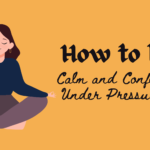How to Stop Worrying About Getting Cheated On: Fear of infidelity is one of the most common anxieties in romantic relationships. Whether you’ve been cheated on before, have seen others go through it, or just feel insecure, the fear of betrayal can be overwhelming. It can lead to stress, overthinking, trust issues, and even damage a healthy relationship. However, constantly worrying about getting cheated on won’t prevent it from happening—instead, it can create unnecessary emotional strain and even push your partner away.
If you find yourself struggling with these fears, it’s important to work through them in a healthy and constructive way. This article will help you understand why you feel this way and how to stop worrying about infidelity, so you can build a stronger, happier, and more secure relationship.
Also Read:
- How to be Calm and Confident under Pressure?
- How to Get over Someone that You See Everyday?
- How to Heal after Breaking up with Someone You Love?
Understanding Your Fear of Being Cheated On
Before learning how to stop worrying, it’s essential to understand why you feel this way. The fear of infidelity usually stems from:
- Past Experiences – If you’ve been cheated on before, it’s natural to develop trust issues.
- Low Self-Esteem – Feeling “not good enough” can make you believe your partner will look for someone better.
- Lack of Trust – Whether due to past trauma or current relationship issues, a lack of trust creates insecurity.
- Social Media Influence – Constant exposure to stories of cheating can make you feel like it’s more common than it actually is.
- Attachment Style – People with an anxious attachment style often worry about being abandoned or replaced.
- Lack of Communication – If you and your partner aren’t open about your feelings, doubts can grow into fears.
Once you identify why you feel this way, it becomes easier to take targeted steps to overcome it.
How to Stop Worrying About Getting Cheated On
1. Focus on Building Trust
Trust is the foundation of any strong relationship. Instead of assuming the worst, work on creating a bond where honesty and openness thrive. Here’s how:
- Have transparent conversations with your partner about your fears.
- Observe their actions—trustworthy people show consistency over time.
- Give them the benefit of the doubt instead of jumping to conclusions.
Trust grows when both partners feel safe and respected. Instead of looking for reasons to doubt, look for reasons to trust.
2. Strengthen Your Self-Esteem
Many fears about cheating come from feelings of unworthiness. If you secretly believe you’re “not enough,” you might assume your partner will find someone better.
To combat this:
- Recognize your worth – Make a list of qualities that make you a great partner.
- Engage in self-care – Exercise, eat well, and invest in your passions.
- Stop comparing yourself – Avoid social media comparisons that make you feel insecure.
- Practice positive self-talk – Instead of thinking, “What if they cheat?”, remind yourself, “I am lovable and worthy of a loyal partner.”
When you love and value yourself, you’ll feel more secure in your relationship.
3. Challenge Your Negative Thoughts
Worrying about infidelity is often fueled by overthinking and worst-case scenarios. If you find yourself spiraling into negative thoughts, try this:
- Pause and analyze – Ask yourself, “Do I have actual proof, or am I making assumptions?”
- Look at the facts – If your partner is loving and committed, your fear might be unfounded.
- Replace fear with logic – Instead of “They might cheat,” reframe it to “They have given me no reason to doubt them.”
By questioning your thoughts, you can prevent unnecessary anxiety from taking over.
4. Improve Communication with Your Partner
Lack of communication can fuel insecurities. If you’re feeling uneasy, don’t let it build up in silence—talk to your partner openly.
- Express your feelings without accusing – Say, “I sometimes struggle with insecurity, and I’d love your reassurance,” instead of “I think you’re hiding something.”
- Set boundaries together – Discuss what both of you consider acceptable and unacceptable behavior in a relationship.
- Encourage openness – A healthy relationship is built on mutual understanding and emotional safety.
The more you communicate with honesty, the less room there is for doubt.
5. Avoid Snooping or Seeking Constant Reassurance
When you’re worried about cheating, you might feel tempted to check their phone, social media, or ask for constant reassurance. While this might give short-term relief, it can actually damage trust in the long run.
- Respect privacy – Snooping shows insecurity, not love.
- Let go of control – You cannot “prevent” cheating by watching their every move.
- Trust their words and actions – If they consistently show love and loyalty, believe them.
If your partner feels suffocated by suspicion, it can actually push them away—so focus on trust rather than control.
6. Stop Letting Past Experiences Define Your Present
If you’ve been cheated on before, it’s understandable to fear it happening again. However, not everyone is the same.
- Separate the past from the present – Your current partner is not your ex.
- Acknowledge your trauma, but don’t let it control you – Seek healing through therapy or self-reflection.
- Practice forgiveness (for yourself and others) – Holding onto resentment only hurts you.
A new relationship deserves a fresh start, free from the shadows of the past.
7. Develop Your Own Life Outside the Relationship
One of the best ways to stop obsessing over “what ifs” is to create a fulfilling life outside your relationship.
- Pursue hobbies and passions – Focus on things that make you happy.
- Spend time with friends and family – A strong support system boosts emotional security.
- Set personal goals – Whether it’s career, fitness, or travel, work on your growth.
When your life is full and meaningful, your relationship becomes a part of your happiness, not your entire identity.
8. Accept That You Can’t Control Everything
At the end of the day, no amount of worrying can prevent infidelity. What you can do is:
- Trust yourself – If something truly feels off, you’ll handle it when the time comes.
- Trust your partner – Give them the chance to prove their love and commitment.
- Trust life – No relationship is guaranteed, but that doesn’t mean you should live in fear.
Letting go of fear does not mean ignoring red flags—it means choosing to believe in love instead of living in constant doubt.
Final Thoughts
Worrying about being cheated on can be exhausting and damaging—not just for your relationship, but for your mental health. Instead of living in fear, focus on building trust, improving communication, and strengthening your own self-worth.
By doing this, you’ll not only stop worrying about infidelity, but you’ll also create a stronger, healthier, and happier relationship based on love, trust, and mutual respect.








